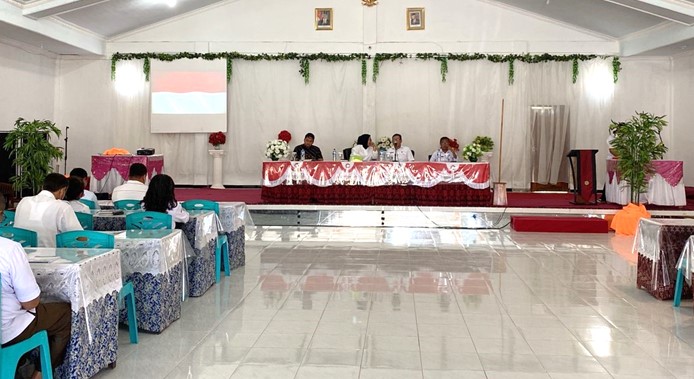The Marine Pollution and Damage Response Team in the Waters of Province of East Nusa Tenggara (NTT) recently carried out one of their work programs, namely technical consultation on oil spill early warning system guidelines in Rote Ndao Regency. Prepared in collaboration with PT BMT Indonesia, the guidelines outline procedures for reporting oil spill events by the community and the subsequent response flow.
On 31 August 2022, 37 participants attended a meeting held at the Graha Narwastu Ba’a Hall in Rote Ndao Regency. One of them was Untung Harjito, a member of the Rote Ndao Regency Regional Secretariat, who was representing the Regent of Rote Ndao. He gave a speech to officially open the event, in which he expressed his appreciation to the NTT Provincial Government for its commitment to Rote Ndao Regency through the Marine Pollution and Environmental Damage Management Team, specifically in developing an oil spill early warning system in Rote Ndao Regency. This system is part of wider efforts to maintain the sustainability of marine resources, which are central to the lives and livelihoods of people living in Rote Ndao Regency.
Sulastri Rasyid is the Secretary of the Marine Pollution and Damage Response Team in the Waters of NTT Province. She also gave a speech, in which she confirmed that the Provincial Government of NTT is committed to tackling pollution and damage to the marine environment. Through the Marine Pollution and Damage Management Team, the NTT Provincial Government will deal with oil spill pollution so that incidents such as the 2009 Montara oil spill, which caused tremendous damage to local ecosystems and destroyed livelihoods based on seaweed farming, do not reoccur.
The presentation of the guidelines for an oil spill early warning system in Rote Ndao Regency was delivered directly by Salman Fariz, who is a representative of PT BMT Indonesia. In his presentation, he stated that the purpose of this guide is to provide direction to the local team (Tier-1) when an oil spill occurs, to establish lines of communication and coordinate with the local team; moreover, it can help to clarify the duties and responsibilities of the local team, while also identifying priority issues when an oil spill occurs.

After the presentation, participants offered feedback and asked questions related to the guidelines. These inputs and suggestions related to (1) the Regional Disaster Management Agency (BPBD) and the National Search and Rescue Agency (BASARNAS) of Rote Ndao Regency being the first line of defence in the event of a disaster related to oil and gas; (2) the need to complete facilities and infrastructure for handling oil spills, which are currently not available in Rote Ndao Regency; (3) the need for training related to oil spill pollution preparedness among local communities; (4) the need to create a system whereby polluters are required to immediately notify the authorities in the event of an oil spill, so that the incident can be handled promptly; and (5) the importance of traditional leaders and community-based surveillance groups (Pokmaswas) in early warning systems.
Before the technical consultation came to a close, the Marine Pollution and Environmental Damage Management Team reiterated its commitment to develop an oil spill early warning system in Rote Ndao Regency. Moving forward, this will include training on reporting and early handling of oil spills to village-level communities in Rote Ndao Regency, by no later than December 2022. The commitment of the province of NTT to become a disaster-responsive area for marine pollution needs to be supported by various regional and national partners. Working alongside the Ministry of Marine Affairs and Fisheries (MMAF), the ATSEA-2 Program will continue to support this process.
(By Mikael Leuape)


